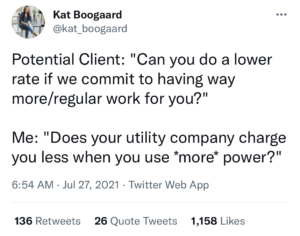Have you ever panic-priced yourself? It’s my term for when someone asks you for your rates and you spout off a sad number that is way lower than what you actually want to charge. I’ve done it more than a few times, especially early in my career—in job interviews, discovery calls, and casual chats with people who were genuinely interested in paying me a good rate. Imposter syndrome would possess me right at the moment I was prepared to advocate for myself, and I would sputter out something entirely different than what I had planned.
Talking about money is uncomfortable for most of us, and especially so when you’re first establishing yourself as a freelancer. It’s awkward to name a price for your own work when you’re still building confidence. And sticking to that price can be tough if you’re faced with any resistance, real or perceived.
Many of us are guilty of dropping our freelancer fees early on in order to appease clients. Sometimes you just need the money and options are slim. Sometimes an opportunity comes around that could lead to great referrals and future work, and it’s worth it to accommodate. But it’s important to recognize the difference between strategy and self-sabotage. The former moves you forward; the latter keeps you stuck in place. So before you go forth and rate-slash, try these tactics for navigating common scenarios.
Talking about money is uncomfortable for most of us.
Scenario #1: You present a price and your client pushes back.
First, a word: You do not need to negotiate. Read that again. If someone questions your price or asks for a lower rate outright, you are by no means required to work with them on it. Your rates are your rates, just like watermelons at the grocery store cost… watermelon prices. Of course, offering flexibility will help you land more clients in the long run, but it’s important to remember that you have not signed a blood oath requiring you to accommodate people just because they ask. Okay. Great.

Now, there are a couple of simple ways to navigate this conversation. First, instead of lowering your price automatically, try explaining the actual value of what you’re offering. Give them a detailed breakdown of your services, focusing on the positive impact this work will have on their business. If you’ve done similar work for other clients with KPIs you can reference, this is a great time to whip out those examples. If they don’t bite, you could instead offer to reduce the scope of the project to honor their budget, so you’re still charging what you deserve.
Scenario #2: You’re in the middle of a project and your client wants to adjust the scope and add more work.
Remember: No. Blood. Oath. Unless your contract says so, you are not required to take on additional work or shift your priorities just because your client requests it. (Hopefully, your proposal and contract explicitly laid out the work you’re doing for them, so you can refer back to it in these moments.) So if you’re not interested or able to do the work that your client is suggesting, you can absolutely push back.
But let’s say your client comes to you and they want to switch gears because their priorities have shifted or there’s more work than expected. If it sounds like a good move for both of you, then you could try offering to adjust the scope of the project for an additional cost. Remind them of the original scope and explain to them that, because the scope is increasing or changing, there will be an additional charge. You can also offer to amend the contract to document these changes so everyone is on the same page. You should absolutely make sure any conversation around changing rates or scope is documented in writing so you can refer back to it later, just in case!
![]()
Scenario #3: A project is deemed complete but the client comes back with heavy follow-up questions or requests for revisions.
This is a very common scenario, and a great opportunity to practice boundaries with clients. It’s easy to jump right in and offer unpaid help to a client, especially once the invoice has been paid. But your time is not free. So when someone requests your help, it’s important to be clear about what you can and cannot do. One simple clarifying question? Sure. But if they send you time-intensive questions or make additional requests, then it’s time to discuss pricing (again).
In this situation, let your client know that you’d love to continue working with them. Then, share your hourly rate. If you had previously charged a project fee or some other price structure, they may not realize that you offer hourly work. You can give them a time estimate if possible and offer to send over an invoice for the extra hours if they’d like to move forward with your help.
Client pushback isn’t the signal to say no or give in entirely—it’s an opportunity to find a win-win.
The Takeaway
If you leave this post with one piece of wisdom, we hope it’s this: Client pushback isn’t the signal to say no or give in entirely—it’s an opportunity to find a win-win. These scenarios may test your confidence and your communication, which is kind of awesome. Having your freelancer fees questioned and navigating tricky conversations is great practice. It helps you build those muscles, so someday soon, you can have money conversations without stress.




